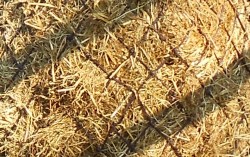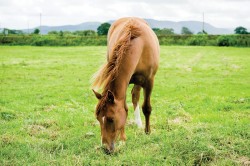The equine has a sensitive digestive system and is designed to be what is known as a “trickle feeder”. This means that the horse is equipped with a small stomach and intended to eat little and often, consuming small amounts of food regularly throughout the day. A natural lifestyle for the horse originally involved the horse roaming and grazing, sometimes travelling many miles by foot each day and ingesting a large variety of different grasses and plants.
Equine domestication has changed the lifestyle for most horses and ponies as stabling and regular exercise, alongside competitive demands, often means that a simple, modern day grass diet is not sufficient to keep our equines healthy. Many equines require additional supplementary hay or haylage in addition to grass, a vitamin and mineral supplement and in some cases a concentrate feed. This, along with the fact that the modern yard often provides little turn out on nutrient deficient pasture, has led to considerable changes being forced upon our equines through domestication. When this lifestyle is paired with the sensitive equine digestive system, incorrect management can result in gastric upsets including debilitating conditions such as colic and gastric ulcers.
The key to avoiding gastric upsets is to provide a diet which is as natural to the horse as possible so Horslyx takes a look at what this means for our equine management routines…
 Firstly the equine should be provided with a diet that is high in forage and therefore fibre. Fibre is so important because it keeps the gut healthy, mobile and allows the equine’s digestive system to function correctly. Long-stemmed forage such as hay and grass is ideal as the digestion of fibre is slow which complements the equine’s innate need to trickle feed and the fibre is fermented naturally in the large intestine.
Firstly the equine should be provided with a diet that is high in forage and therefore fibre. Fibre is so important because it keeps the gut healthy, mobile and allows the equine’s digestive system to function correctly. Long-stemmed forage such as hay and grass is ideal as the digestion of fibre is slow which complements the equine’s innate need to trickle feed and the fibre is fermented naturally in the large intestine.
The horse’s digestive system starts with the mouth. The regular chewing action helps to break down their food, and produces saliva. This saliva becomes mixed with the food and helps to neutralise the stomach acid. Providing long stemmed forage creates more chews per kg of food, which results in more saliva production. The production of saliva is incredibly important when you realise that the equine stomach continually produces gastric acid. When the horse is trickle feeding on forage as nature intended, the stomach is rarely left empty. This presence of fibre creates both a physical barrier to the acid within the stomach and the saliva buffers it raising the pH.
However, when we leave our horses standing for several hours with nothing to eat, and then provide a concentrate feed, which is often high in starch, this can result in a build-up of acid, which can result in damage to the lining of the stomach and lead to ulceration of the stomach wall.
Crucially in order to help avoid gastric upsets when feeding concentrate feed it is vital that the portions are small. The equine stomach can only hold 8% of the total contents of the gastrointestinal tract at any one time so overloading the horse with large portions is a recipe for disaster, especially when ample amounts of forage are not provided throughout the day.
 Finally, modern day pastures and paddocks often consist of only a few varieties of grasses, which are more suitable for feeding cattle and sheep than feeding equines. As a result our horses often gain too many calories, but can be lacking in the vital vitamins and minerals necessary to balance the diet. Therefore the horse also requires an additional high quality source of vitamins and minerals. Vitamins and minerals are an important aspect of diet and in the wild the horse would have roamed freely sampling a wide variety of plants, herbs and grasses to get what they need, nowadays as horse owners, we need to provide what our equine may be deficient in so as to promote optimum health.
Finally, modern day pastures and paddocks often consist of only a few varieties of grasses, which are more suitable for feeding cattle and sheep than feeding equines. As a result our horses often gain too many calories, but can be lacking in the vital vitamins and minerals necessary to balance the diet. Therefore the horse also requires an additional high quality source of vitamins and minerals. Vitamins and minerals are an important aspect of diet and in the wild the horse would have roamed freely sampling a wide variety of plants, herbs and grasses to get what they need, nowadays as horse owners, we need to provide what our equine may be deficient in so as to promote optimum health.
